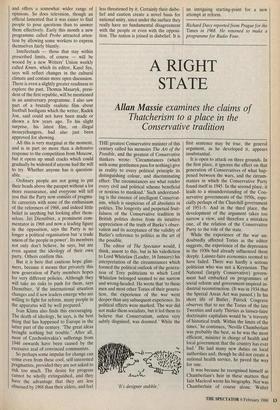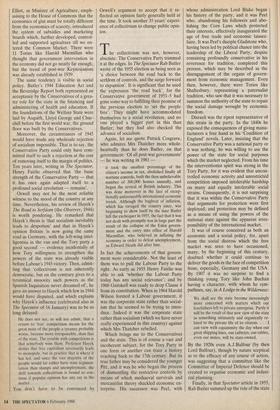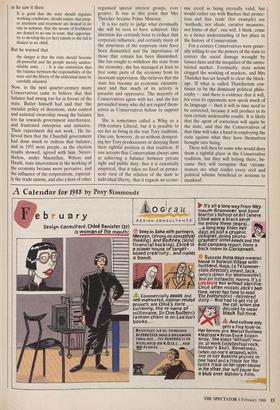A RIGHT STATE
Allan Massie examines the claims of Thatcherism to a place in the Conservative tradition
THE greatest Conservative minister of this century called his memoirs The Art of the Possible, and the greatest of Conservative thinkers wrote: 'Circumstances (which with some gentlemen pass for nothing) give in reality to every political principle its distinguishing colour, and discriminating effect. The circumstances are what render every civil and political scheme beneficial or noxious to mankind.' Such understand- ing is the essence of intelligent Cohservat- ism, which is suspicious of all absolutes in politics. The longevity and perpetual fruit- fulness of the Conservative tradition in British politics derive from its intuitive appreciation of the truth of Burke's obser- vation and its acceptance of the validity of Butler's reference to politics as the art of the possible.
The editor of The Spectator would, I think, assent to this, but in his valediction to Lord Whitelaw (Leader, 16 January) his interpretation of the circumstances which formed the political outlook of the genera- tion of Tory politicians to which Lord Whitelaw belonged seemed to me narrow and wrong-headed. He wrote that 'to these men and most other Tories of their genera- tion, the experience of the war went deeper than any subsequent experience. Its political effects were marked. The war did not make them socialists, but it led them to believe that Conservatism, unless very subtly disguised, was doomed.' While the `It's designer stubble.' first sentence may be true, the general argument, as he developed it, appears insubstantial.
It is open to attack on three grounds.. In the first place, it ignores the effect on that generation of Conservatives of what hap- pened between the wars, and the circum- stances in which the Conservative Party found itself in 1945. In the second place, it leads to a misunderstanding of the Con- servative governments of the 1950s, espe- cially perhaps of the Churchill government of 1951-5. And in the third place, the developMeht of the argument takes too narrow a view, and therefore a mistaken one, of the relation of the Conservative Party to the role of the state.
While the, experience of the war un- doubtedly affected Tories as the editor suggests,, the experience of the depression in the 1930s had already influenced them deeply. Laissez-faire economics seemed to have failed. There was hardly a serious politician who was not a Keynesian. The National (largely Conservative) govern- ment had embarked on programmes of social reform and government-inspired in- dustrial reconstruction. (It was in 1934 that the Special Areas Act was passed.) In his short life of Butler, Patrick Cosgrave observes that to see the Tories of the late Twenties and early Thirties as laissez-faire doctrinaire capitalists would be 'a travesty of historical truth. Within the limits of the times,' he continues, 'Neville Chamberlain was probably the best, as he was the most efficient, minister in charge of health and local government that the country has ever had.' He laid many new duties on local authorities and, though he did not create a national health service, he paved the way for one.
It was because he recognised himself as Chamberlain's heir in these matters that lain Macleod wrote his biography. Nor was Chamberlain of course alone. Walter Elliot, as Minister of Agriculture, emph- asising to the House of Commons that the economics of glut must be totally different from the economics of scarcity, introduced the system of subsidies and marketing boards which, further developed, control- led and supported agriculture till we en- tered the Common Market. There were 11 Tories like Harold Macmillan who thought that government intervention in the economy did not go nearly far enough, but the trend of post-war Keynesianism was already established in 1939.
The same tendency is visible in social policy. Butler's. 1944 Education Act and the Beveridge Report both represented an acceptance by the Conservatives of a grea- ter role for the state in the financing and administering of health and education. If the foundations of the Welfare State were laid by Asquith, Lloyd George and Chur- chill before the first world war, the ground floor was built by the Conservatives.
Moreover, the circumstances of 1945 would have made any wholesale rejection of socialism impossible. That is to say, the Conservative Party could only have com- mitted itself to such a rejection at the cost of removing itself to the margin of politics. Ten years later, writing in The Spectator, Henry Fairlie observed that 'the basic strength of the Conservative Party — that it has once again adapted itself to a profound social revolution — remains'.
Orwell may not be the most reliable witness to the mood of the country at any time. Nevertheless, his review of Hayek's The Road to Serfdom (the Observer, 1944) is worth pondering. He remarked that Hayek's thesis is 'that socialism inevitably leads to despotism' and that in Hayek's opinion Britain 'is now going the same road as Germany, with the left-wing intel- ligentsia in the van and the Tory party a good second' — evidence incidentally of how Tory willingness to strengthen the powers of the state was already visible before Labour's 1945 victory. Then, admit- ting that 'collectivism is not inherently democratic, but on the contrary gives to a tyrannical minority such powers as the Spanish Inquisition never dreamed of , he gave an answer to Hayek which few in 1944 would have disputed, and which explains why Hayek's influence (celebrated also in The Spectator of 16 January) was to be so long delayed:
He does not see, or will not admit, that a return to 'free' competition means for the great mass of the people a tyranny probably worse, because more irresponsible, than that of the state. The trouble with competitions is that somebody wins them. Professor Hayek denies that free capitalism necessarily leads to monopoly, but in practice that is where it has led, and since the vast majority of the people would far rather have state regimen- tation than slumps and unemployment, the drift towards collectivism is bound to con- tinue if popular opinion has any say in the matter.
You don't have to be convinced by Orwell's argument to accept that it re- flected an opinion fairly generally held at the time. It took another 35 years' experi- ence of collectivism to change public opin- ion.
The collectivism was not, however, absolute. The Conservative Party trimmed it at the edges. In The Spectator Rab Butler wrote of the 1955 election as being seen as 'a choice between the road back to the serfdom of controls, and the surge forward to expansion'. It is significant that he used the expression 'the road back', for the Conservative government of 1951-5 had gone some way to fulfilling their promise of the previous election to 'set the people free'. They might have accommodated themselves to a social revolution, and no one played a bigger part in this than Butler; but they had also checked the advance of socialism.
Again, let me quote Patrick Cosgrave, who admires Mrs Thatcher more whole- heartedly than he does Butler, on that government: 'Of all post-war governments' — he was writing in 1981 - it took the smallest percentage of the citizen's income in tax, abolished finally all wartime controls, built the then unbelievable number of 300,000 houses annually, and began the revival of British industry. This was done moreover in the face of excep- tionally unfavourable international economic trends. Although the bugbear of inflation, which has ravaged the country since, was beginning to show itself by the time Butler left the exchequer in 1955, the fact that it was not dealt with promptly was in large part the result of the collapse of the Eden govern- ment and the entry into office of Harold Macmillan, who believed in inflating the economy in order to defeat unemployment, as Edward Heath did after him.
In fact the achievements of that govern- ment were considerable. Not the least of them was to pull the Labour Party to the right. As early as 1955 Henry Fairlie was able to ask 'whether the Labour Party today has any social relevance'; and by 1960 Gaitskell was ready to drop Clause 4 from its constitution. When in 1964 Harold Wilson formed a Labour government, it was the corporate state rather than social- ism that he seemed to be trying to intro- duce. Indeed it was the corporate state rather than socialism (which we have never really experienced in this country) against which Mrs Thatcher rebelled.
Which brings me to the Conservatives and the state. This is of course a vast and incoherent subject, for the Tory Party in one form or another can trace a history reaching back to the 17th century. But its true father may be considered the younger Pitt, and it was he who began the process of dismantling the restrictive controls by means of which mediaeval survivals and mercantilist theory shackled economic en- terprise. His successor was Peel, with whose administration Lord Blake began his history of the party, and it was Peel who, abandoning his followers and abo- lishing the Corn Laws which protected their interests, effectively inaugurated the age of free trade and economic laissez- faire. It was Peel's disciple Gladstone who, having been led by political chance into the leadership of the Liberal Party, despite remaining profoundly conservative in his reverence for tradition, completed this process, which may be described as the disengagement of the organs of govern- ment from economic management. Even then, however, there were Tories like Shaftesbury, representing a paternalist tradition, who saw that it was necessary to summon the authority of the state to repair the social damage wrought by economic freedom.
Disraeli was the ripest representative of this strain in the party. In the 1840s he exposed the consequences of giving manu- facturers a free hand in his 'Condition of England' novels. Later, insisting that the Conservative Party was a national party or it was nothing, he was willing to use the power of the state for social purposes which the market neglected. From his time the interventionist spirit was strong in the Tory Party, for it was evident that uncon- trolled economic activity and unrestricted competition imposed intolerable hardship on many and equally intolerable social strains. Consequently, it is not surprising that it was within the Conservative Party that arguments for protection were first deployed; and protection may be defined as a means of using the powers of the national state against the apparent irres- ponsibility of the international market.
It was of course conceived as both an economic and a social policy, for, apart from the social distress which the free market was seen to have occasioned, many, by the beginning of this century, doubted whether it could continue to deliver the goods in the face of competition from, especially, Germany and the USA. By 1907 it was no surprise to find a thinking young Tory like John Buchan having a character, with whom he sym- pathises, say, in A Lodge in the Wilderness:
We shall see the state become increasingly more concerned with matters which our forefathers left to private enterprise. Partly it will be the result of that new view of the state as something intimately and organically re- lated to the private life of its citizens. . . . I can view with equanimity the day when our great shipping lines, our railways, our cables, even our mines, will be state-owned.
By the 1920s even A.J.Balfour (by then Lord Balfour), though by nature sceptical as to the efficacy of any course of action, was suggesting that a committee like the Committee of Imperial Defence should be created to organise economic and indust- rial planning.
Finally, in that Spectator article in 1955, Rab Butler summed up the role of the state as he saw it then:
It is good that the state should regulate working conditions, should ensure that prop- er attention and treatment are denied to no one in sickness, that the means of livelihood are denied to no one in want, that opportun- ity to develop his (or her) talents to the full is denied to no child.
But he warned that
the danger is that the state should become all-powerful and the people merely uniden- tifiable units. . . . It is our contention that the balance between the responsibility of the state and the liberty of the individual must be carefully adjusted.
Now, in the next quarter-century many Conservatives came to believe that that balance had swung too far in favour of the state. Butler himself had said that 'the socialist policy of directions, state control and national ownership swung the balance too far towards government interference, and frustrated enterprise and initiative. Their experiment did not work.' He be- lieved then that the Churchill government had done much to redress that balance, and in 1955 most people, as the election results showed, agreed with him. Never- theless, under Macmillan, Wilson and Heath, state intervention in the working of the economy became more pervasive, and the influence of the corporations, especial- ly the trade unions, and also a host of other organised special interest groups, ever greater. It was at this point that Mrs Thatcher became Prime Minister.
It is too early to judge what eventually she will be seen to have achieved. Her intention has certainly been to reduce that corporate influence, and certainly many of the structures of the corporate state have been dismantled and the importance of those that remain has been diminished. She has sought to withdraw the state from the economy; she has managed at least to free some parts of the economy from its incessant supervision. She believes that the state has become an economic encumbr- ance and that much of its activity is parasitic and oppressive. The majority of Conservatives agree with her, and she has persuaded many who did not regard them- selves as Conservatives before to support her.
She is sometimes called a Whig or a 19th-century Liberal, but it is possible to see her as being in the true Tory tradition. One can, however, do so without denigrat- ing her Tory predecessors or denying them their rightful position in that tradition. If one accepts that Conservatism always aims at achieving a balance between private right and public duty, that it is essentially empirical, that it takes no fixed or perma- nent view of the relation of the state to individual liberty, that it regards no econo- mic creed as being eternally valid, but would rather say with Buchan that protec- tion and free trade (for example) are `methods, not ideals; curative measures, not forms of diet', one will, I think, come to a better understanding of her place in the history of Conservatism.
For a century Conservatives were gener- ally willing to use the powers of the state to correct the social damage wrought by laissez-faire and the inequities of the unres- tricted market. Eventually, state action clogged the working of markets, and Mrs Thatcher has set herself to clear the block- age. If what is called Thatcherism con- tinues to be the dominant political philo- sophy — and there is evidence that it will, for even its opponents now speak much of its language — then it will in time need to be corrected, because it will produce in its turn certain undesirable results. It is likely that the agent of correction will again be the state, and that the Conservatives of that time will take a hand in employing the state against what they have themselves brought into being.
There will then be some who would deny them a rightful place in the Conservative tradition, but they will belong there, be- cause they will recognise that 'circum- stances are what render every civil and political scheme beneficial or noxious to mankind'.




















































 Previous page
Previous page